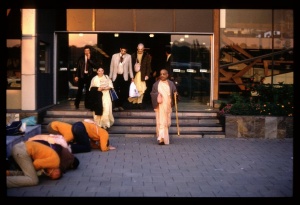SB 1.11.6: Difference between revisions
m (1 revision(s)) |
(Vanibot #0054 edit - transform synonyms into clickable links, which search similar occurrences) |
||
| (One intermediate revision by one other user not shown) | |||
| Line 1: | Line 1: | ||
{{info | {{info | ||
|speaker=citizens of | |speaker=citizens of Dvārakā | ||
|listener=Lord | |listener=Lord Kṛṣṇa the Supreme Personality of Godhead | ||
}} | }} | ||
[[Category:Srimad-Bhagavatam - Canto 01 Chapter 11|S06]] | |||
[[Category:Bhagavatam Verses Spoken by the Citizens of Dvaraka - Vanisource|011106]] | |||
<div style="float:left">'''[[Srimad-Bhagavatam]] - [[SB 1|First Canto]] - [[SB 1.11: Lord Krsna's Entrance into Dvaraka|Chapter 11: Lord Kṛṣṇa's Entrance into Dvārakā]]'''</div> | |||
<div style="float:right">[[File:Go-previous.png|link=SB 1.11.4-5]] '''[[SB 1.11.4-5]] - [[SB 1.11.7]]''' [[File:Go-next.png|link=SB 1.11.7]]</div> | |||
{{CompareVersions|SB|1.11.6|SB 1964|SB 1972-77}} | |||
{{RandomImage}} | |||
==== TEXT 6 ==== | ==== TEXT 6 ==== | ||
<div class="verse"> | |||
<div | :natāḥ sma te nātha sadāṅghri-paṅkajaṁ | ||
natāḥ sma te nātha sadāṅghri-paṅkajaṁ | :viriñca-vairiñcya-surendra-vanditam | ||
viriñca-vairiñcya-surendra-vanditam | :parāyaṇaṁ kṣemam ihecchatāṁ paraṁ | ||
parāyaṇaṁ kṣemam ihecchatāṁ paraṁ | :na yatra kālaḥ prabhavet paraḥ prabhuḥ | ||
na yatra kālaḥ prabhavet paraḥ prabhuḥ | |||
</div> | </div> | ||
| Line 18: | Line 23: | ||
==== SYNONYMS ==== | ==== SYNONYMS ==== | ||
<div class="synonyms"> | |||
<div | ''[//vanipedia.org/wiki/Special:VaniSearch?s=natāḥ&tab=syno_o&ds=1 natāḥ]'' — bowed down; ''[//vanipedia.org/wiki/Special:VaniSearch?s=sma&tab=syno_o&ds=1 sma]'' — we had done so; ''[//vanipedia.org/wiki/Special:VaniSearch?s=te&tab=syno_o&ds=1 te]'' — unto You; ''[//vanipedia.org/wiki/Special:VaniSearch?s=nātha&tab=syno_o&ds=1 nātha]'' — O Lord; ''[//vanipedia.org/wiki/Special:VaniSearch?s=sadā&tab=syno_o&ds=1 sadā]'' — always; ''[//vanipedia.org/wiki/Special:VaniSearch?s=aṅghri&tab=syno_o&ds=1 aṅghri]-[//vanipedia.org/wiki/Special:VaniSearch?s=paṅkajam&tab=syno_o&ds=1 paṅkajam]'' — the lotus feet; ''[//vanipedia.org/wiki/Special:VaniSearch?s=viriñca&tab=syno_o&ds=1 viriñca]'' — Brahmā, the first living being; ''[//vanipedia.org/wiki/Special:VaniSearch?s=vairiñcya&tab=syno_o&ds=1 vairiñcya]'' — sons of Brahmā like Sanaka and Sanātana; ''[//vanipedia.org/wiki/Special:VaniSearch?s=sura&tab=syno_o&ds=1 sura]-[//vanipedia.org/wiki/Special:VaniSearch?s=indra&tab=syno_o&ds=1 indra]'' — the King of heaven; ''[//vanipedia.org/wiki/Special:VaniSearch?s=vanditam&tab=syno_o&ds=1 vanditam]'' — worshiped by; ''[//vanipedia.org/wiki/Special:VaniSearch?s=parāyaṇam&tab=syno_o&ds=1 parāyaṇam]'' — the supreme; ''[//vanipedia.org/wiki/Special:VaniSearch?s=kṣemam&tab=syno_o&ds=1 kṣemam]'' — welfare; ''[//vanipedia.org/wiki/Special:VaniSearch?s=iha&tab=syno_o&ds=1 iha]'' — in this life; ''[//vanipedia.org/wiki/Special:VaniSearch?s=icchatām&tab=syno_o&ds=1 icchatām]'' — one who so desires; ''[//vanipedia.org/wiki/Special:VaniSearch?s=param&tab=syno_o&ds=1 param]'' — the highest; ''[//vanipedia.org/wiki/Special:VaniSearch?s=na&tab=syno_o&ds=1 na]'' — never; ''[//vanipedia.org/wiki/Special:VaniSearch?s=yatra&tab=syno_o&ds=1 yatra]'' — wherein; ''[//vanipedia.org/wiki/Special:VaniSearch?s=kālaḥ&tab=syno_o&ds=1 kālaḥ]'' — inevitable time; ''[//vanipedia.org/wiki/Special:VaniSearch?s=prabhavet&tab=syno_o&ds=1 prabhavet]'' — can exert its influence; ''[//vanipedia.org/wiki/Special:VaniSearch?s=paraḥ&tab=syno_o&ds=1 paraḥ]'' — transcendental; ''[//vanipedia.org/wiki/Special:VaniSearch?s=prabhuḥ&tab=syno_o&ds=1 prabhuḥ]'' — the Supreme Lord. | ||
</div> | </div> | ||
| Line 26: | Line 30: | ||
==== TRANSLATION ==== | ==== TRANSLATION ==== | ||
<div class="translation"> | |||
<div | |||
The citizens said: O Lord, You are worshiped by all demigods like Brahmā, the four Sanas and even the King of heaven. You are the ultimate rest for those who are really aspiring to achieve the highest benefit of life. You are the supreme transcendental Lord, and inevitable time cannot exert its influence upon You. | The citizens said: O Lord, You are worshiped by all demigods like Brahmā, the four Sanas and even the King of heaven. You are the ultimate rest for those who are really aspiring to achieve the highest benefit of life. You are the supreme transcendental Lord, and inevitable time cannot exert its influence upon You. | ||
</div> | </div> | ||
| Line 34: | Line 37: | ||
==== PURPORT ==== | ==== PURPORT ==== | ||
<div class="purport"> | |||
The Supreme Lord is Śrī Kṛṣṇa, as confirmed in [[Bhagavad-gita As It Is (1972)|''Bhagavad-gītā'']], ''Brahma-saṁhitā'' and other authorized Vedic literatures. No one is equal to or greater than Him, and that is the verdict of all scriptures. The influence of time and space is exerted upon the dependent living entities, who are all parts and parcels of the Supreme Lord. The living entities are predominated ''brahma'', whereas the Supreme Lord is the predominating Absolute. As soon as we forget this clear fact, we are at once in illusion, and thus we are put into threefold miseries, as one is put into dense darkness. The clear consciousness of the cognizant living being is God consciousness, in which one bows down unto Him in all circumstances. | |||
</div> | |||
<div | |||
<div style="float:right; clear:both;">[[File:Go-previous.png|link=SB 1.11.4-5]] '''[[SB 1.11.4-5]] - [[SB 1.11.7]]''' [[File:Go-next.png|link=SB 1.11.7]]</div> | |||
</div> | __NOTOC__ | ||
__NOTOC__ | __NOEDITSECTION__ | ||
Latest revision as of 17:55, 17 February 2024

A.C. Bhaktivedanta Swami Prabhupada
TEXT 6
- natāḥ sma te nātha sadāṅghri-paṅkajaṁ
- viriñca-vairiñcya-surendra-vanditam
- parāyaṇaṁ kṣemam ihecchatāṁ paraṁ
- na yatra kālaḥ prabhavet paraḥ prabhuḥ
SYNONYMS
natāḥ — bowed down; sma — we had done so; te — unto You; nātha — O Lord; sadā — always; aṅghri-paṅkajam — the lotus feet; viriñca — Brahmā, the first living being; vairiñcya — sons of Brahmā like Sanaka and Sanātana; sura-indra — the King of heaven; vanditam — worshiped by; parāyaṇam — the supreme; kṣemam — welfare; iha — in this life; icchatām — one who so desires; param — the highest; na — never; yatra — wherein; kālaḥ — inevitable time; prabhavet — can exert its influence; paraḥ — transcendental; prabhuḥ — the Supreme Lord.
TRANSLATION
The citizens said: O Lord, You are worshiped by all demigods like Brahmā, the four Sanas and even the King of heaven. You are the ultimate rest for those who are really aspiring to achieve the highest benefit of life. You are the supreme transcendental Lord, and inevitable time cannot exert its influence upon You.
PURPORT
The Supreme Lord is Śrī Kṛṣṇa, as confirmed in Bhagavad-gītā, Brahma-saṁhitā and other authorized Vedic literatures. No one is equal to or greater than Him, and that is the verdict of all scriptures. The influence of time and space is exerted upon the dependent living entities, who are all parts and parcels of the Supreme Lord. The living entities are predominated brahma, whereas the Supreme Lord is the predominating Absolute. As soon as we forget this clear fact, we are at once in illusion, and thus we are put into threefold miseries, as one is put into dense darkness. The clear consciousness of the cognizant living being is God consciousness, in which one bows down unto Him in all circumstances.